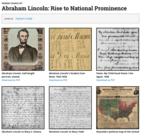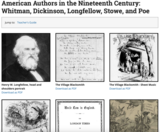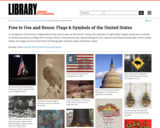
Primary Source Set from the Library of Congress about Abraham Lincoln's political timeline and career
- Subject:
- Social Science
- Material Type:
- Primary Source
- Provider:
- Library of Congress
- Date Added:
- 11/09/2023

The resources in this collection were created by the Library of Congress. The Library of Congress offers classroom materials and professional development to help teachers use primary sources from the Library's vast digital collections.

Primary Source Set from the Library of Congress about Abraham Lincoln's political timeline and career

This primary source set includes documents and images from the life of Alexander Hamilton. A teacher guide is included to assist educators in utilizing the primary sources in their instruction.

This primary source set includes documents and images from the lives of American authors in the 19th century. A teacher guide is included to assist educators in utilizing the primary sources in their instruction.

Baseball has been part of the culture of the United States since the earliest days of the nation, and the ways in which the game has changed through the centuries provide opportunities to explore changes in U.S. society. This primary source set includes documents and images. A teacher guide is included to assist educators in utilizing the primary sources in their instruction.

On September 25, 1789, the First Congress of the United States proposed to the state legislatures 12 amendments to the Constitution that met the arguments most frequently advanced against it. The first two proposed amendments, which concerned the number of constituents for each representative and the compensation of congressmen, were not ratified. Articles 3 to 12, however, were ratified by three-fourths of the state legislatures and constitute the first ten amendments of the Constitution, known as the Bill of Rights.

In this lesson, students will examine a copy of twelve possible amendments to the United States Constitution as originally sent to the states for their ratification in September of 1789. Students will debate and vote on which of these amendments they would ratify and compare their resulting “Bill of Rights” to the ten amendments ratified by ten states that have since been known by this name.

This lesson relates to the westward movement in the United States in the late nineteenth and early twentieth centuries. Students analyze the role that gunfighters played in the settlement of the West and distinguish between their factual and fictional accounts using American Life Histories: Manuscripts from the Federal Writers' Project, 1936-1940.

In this lesson students analyze a single photograph from the Library of Congress collection Civil War Glass Negatives and Related Prints. Using the skills developed, students then find and analyze other images. Conclusions reached will allow students develop links between the Civil War and American industrialization.

They met in Philadelphia in May 1787. Fifty-five men from 12 different states gathered, intending to revise the Articles of Confederation... Thus began the Constitutional Convention – the four-month process of secret argument, debate and compromise that produced a document that would soon be known in all corners of the globe: the Constitution of the United States. This primary source set includes documents and images. A teacher guide is included to assist educators in utilizing the primary sources in their instruction.

Students will investigate a series of maps depicting a voyage by Sir Francis Drake which involved attacks on the Spanish settlements off the coast of Africa (Santiago), Caribbean (Santo Domingo), South America (Cartagena), and North America (St. Augustine). Students will then examine a map of the entire voyage. Students will look closely at the details of each of these depictions and draw conclusions about the individual events as well as the entire voyage.

Information from the Library of Congress about the impact of stances on foreign policy and peace on presidential elections and campaigns.

Information from the Library of Congress about the Founding of the USA, elections, and voting

The papers of nineteenth-century African American abolitionist Frederick Douglass (1818-1895), who escaped from slavery and then risked his freedom by becoming an outspoken antislavery lecturer, writer, and publisher, consist of approximately 7,400 items (38,000 images), most of which were digitized from 34 reels of previously produced microfilm. The collection spans the years 1841-1964, with the bulk of the material dating from 1862 to 1895. Many of Douglass’s earlier writings were destroyed when his house in Rochester, New York, burned in 1872.

In recognition of American Independence Day, also known as the Fourth of July, this selection of rights-free images showcases a variety of national symbols and flags from ancient times to the present day. Representing the rich cultures and diverse landscapes of the United States, all images are from the Prints & Photographs Division unless otherwise noted.

George Washington: First in War, First in Peace, and First in the Hearts of His Countrymen consists of three lessons examining George Washington's leadership in the French and Indian War, at the Federal Convention, and as chief executive. They are based on primary source documents from George Washington Papers. The documents from Washington's Letterbooks include focus questions that may be used in Socratic seminars, cooperative learning, individual and group work.

Primary sources are the raw materials of history — original documents and objects that were created at the time under study. They are different from secondary sources, accounts that retell, analyze, or interpret events, usually at a distance of time or place. This webpage will help educators teach students using primary sources and engage them in analyzes these sources.

The William A. Gladstone Collection of African American Photographs provides almost 350 images showing African Americans and related military and social history. The Civil War era is the primary time period covered, with scattered examples through 1945. Most of the images are photographs, including 270 cartes de visite. For the list of approximately 100 different photographers, see the Creator/Related Names Index.

By examining primary sources, including songs, newspapers, interviews, and photographs of migrant farm workers in California during the Great Depression, students create a scrapbook from the point of view of a migrant worker, providing evidence of the colloquial speech used by the migrants and the issues affecting their lives. Using Voices from the Dust Bowl, 1940-1941 and Farm Security Administration/Office of War Information Black-and-White Negatives, students select photographs and use the sound recordings of voices of the migrant workers to create captions, letters, and/or songs based on these primary sources. This lesson can be used in connection with a unit on the Great Depression, and specifically on The Grapes of Wrath.

Hawaii is a group of volcanic islands in the central Pacific Ocean that together became the 50th state in 1959. The primary sources in this set document key moments in the state’s story, and provide opportunities for students to explore that rich history further. This primary source set includes documents and images. A teacher guide is included to assist educators in utilizing the primary sources in their instruction.

Information and examination into political campaigning, a small primary source excerpt, and an audio clip of Calvin Coolidge about Law and Order while he attempts to persuade voters.